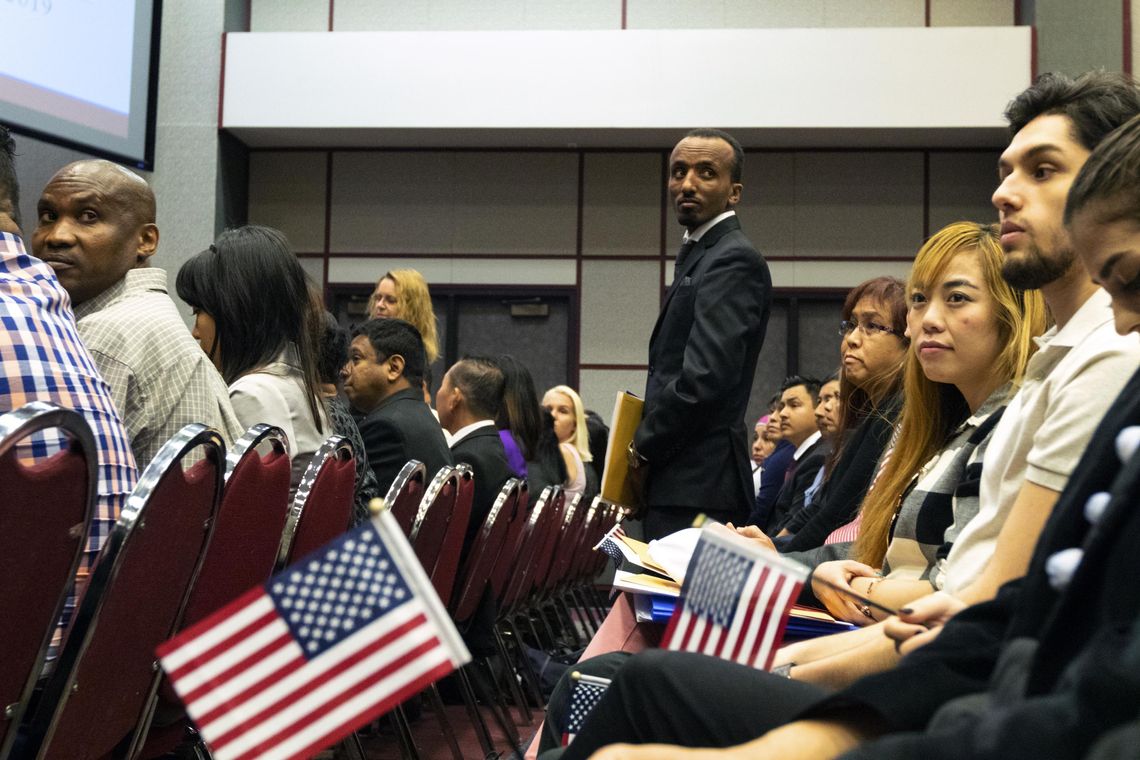It’s a status that many are born into, but for others, U.S. citizenship is the reward at the end of an arduous path. This week, in a ballroom packed with friends and families, 248 people from 58 countries became U.S. citizens at the annual naturalization ceremony at Texas State University.
“Naturalization is the process by which U.S. citizenship is conferred upon foreign citizens or nationals after fulfilling the requirements established by Congress,” a press release from the university explained. “After naturalization, foreign-born citizens enjoy nearly all the same benefits, rights and responsibilities that the Constitution gives to native-born U.S. citizens, including the right to vote.”
At the ceremony, the League of Women Voters was on hand to provide information about voter registration. Other area organizations — Main Street, Centro Cultural Hispano de San Marcos, Indigenous Cultures Institute, the Mexican Consulate in Austin and Texas State’s Student Community of Progressive Empowerment — had tables set up inside the LBJ Student Center Ballroom to provide information about their services and resources. U.S. Magistrate Judge for the Western District of Texas Mark Lane presided over the ceremony and administered the citizenship oath.
This was the fourth annual ceremony developed as a collaboration between the Hispanic Policy Network, Attorney for Students, Honors College, Student Diversity and Inclusion, and U.S. Citizenship and Immigration Services.
Last year, approximately 25 countries were represented, the Hispanic Policy Network stated.
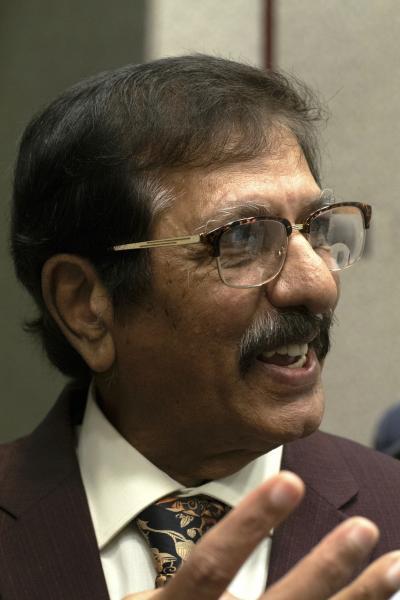
Amin Virani, originally from India, speaks effusively about how, with the help of his wife Yashmin, he spent every spare moment studying for his citizenship test.
‘I didn’t sleep for 30 days’
Naturalization requires applicants to take a rigorous test about U.S. government and history.
“I didn’t sleep for 30 days,” new citizen Amin Virani said about the citizenship process. He spent every possible minute studying for his citizenship test, with his wife Yashmin urging him on “like a schoolboy. ‘Do your homework!’”
Virani, who came to the United States from India, said that his mobile phone was instrumental in helping him prepare for the test because he could use it to access study materials in any spare moment he had, day or night.
That hard work — along with the hard decisions and rough journeys that many of the new citizens made to get here — was acknowledged by speakers at the ceremony.
Jesse Silva, president of the Hispanic Policy Network, stated, “As a son of immigrant parents and brother of immigrant siblings who together left their home and migrated to this great country, I can attest to the pride and joy that you feel in this moment.”
Maria Rocha, executive director of the Indigenous Cultures Institute, also spoke at the ceremony, welcoming the new citizens with comments about the history and sacred nature of San Marcos. She began by telling the audience about the Coahuiltecans who lived here 13,000 years ago and shared with them the two-part greeting of the Coahuiltecans: “A manam,” which means, “It is good,” and the response, “Yo manam,” which means, “All is good.”
Rocha spoke about San Marcos’ status as the oldest continuously inhabited site in North America.
“So can you imagine — for 13,000 years, people have lived here, died here, been buried here, had their ceremonies here, had their prayers here, and that made it a very sacred place,” she said. “Today we’re here for a very sacred ceremony where you all will be taking a very sacred oath here on sacred land. And it is good. All is good. Yo manam.”
Mark Kinzler, Texas State’s attorney for students specializing in immigration, spoke about the stories he has heard from his clients over the years.
“I’ve seen the strength and resilience they’ve shown often during a long journey — the many steps it takes to arrive here at this point,” he said. “... Your struggles, your achievements, your culture, your language, your experiences of the world, all of these things you have carried with you on your journey. … And it strengthens us and it enriches us as a people.”
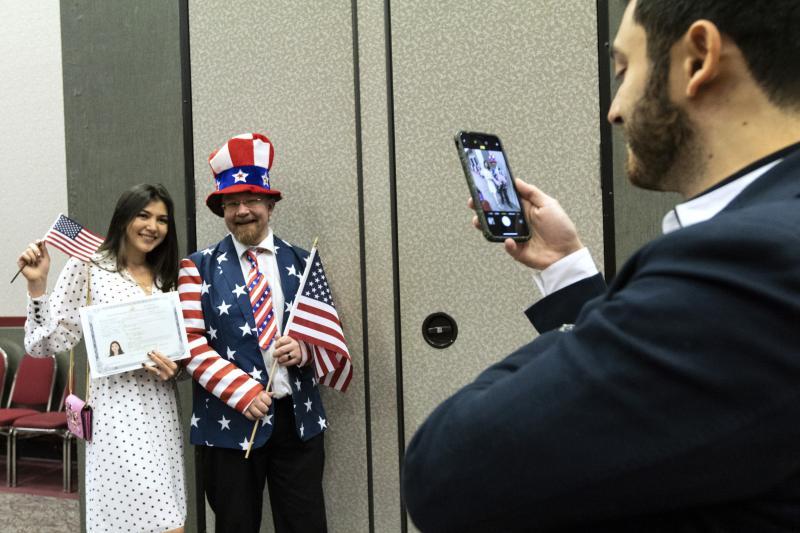
Kamila Omarova of Kazakhstan and Dewi Morgan of the United Kingdom pose together with their Certificates of Naturalization as Omarova’s husband David Zavtian takes a celebratory photo.
Kinzler said that his father is an immigrant from Germany who came over when he was 5 years old. He told a story about how Americans who thought his father’s name was too difficult to pronounce decided to call him “Chuck,” and after he became a citizen he added “Charles” to his legal name to honor that. The nickname “Chuck” has stuck with him all these years, Kinzler said, and is part of his immigrant story.
“Each of you here today has an immigrant story as well,” he said. “And I would urge you to use your voice and tell that story to anyone who would listen.”
San Marcos resident Aart Millecam, a native of the Netherlands, shared his immigration story with the audience. He was an exchange student in Michigan for a year, then two years later he returned to the United States. In 1965, he took a course that made him eligible to become a U.S. citizen but he did not take that step. He later met his wife, Melissa, then moved to San Marcos and, after their daughter was born, decided to become a U.S. citizen in 1977.
“I’ve never regretted it,” he said.
He also emphasized the role that a welcoming community can have for new citizens.
“I’ve always been extremely humbled and extremely grateful to the community Melissa and I have had around us,” he said. “... Community is so important to all of us.”
Millecam, a longtime elections worker, also emphasized the importance of registering to vote and of voting. He cited several local elections that had been decided by a handful of votes.
“Your vote counts,” he said. “... I want you to always remember that you are in charge.”
Millecam also urged the new citizens to share their traditions with their neighbors.
“All of your stories are now part of the fabric and tapestry of our nation,” he said.
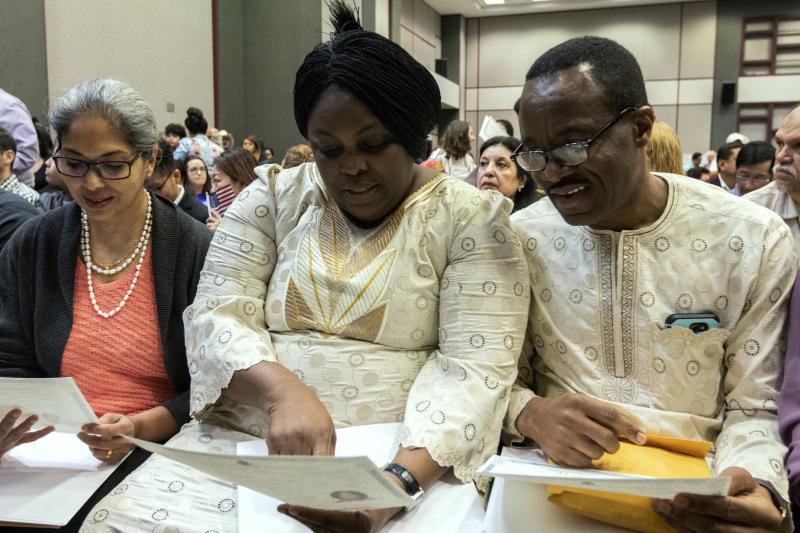
Yemesi Dorcas Abudu and Omotayo Adeniyi Abudu, both of Nigeria, look at their Certificates of Naturalization following the ceremony.
‘Never forget where you came from’
The ceremony continued with a count of citizenship applicants; 250 had been expected, but two were absent. Of the 248 present, 55 had applied for name changes along with citizenship. All were approved and granted.
Participants hailed from 58 different countries from regions around the world: Western and Eastern Europe; North, East and West Africa; North and South America; the Caribbean; East, West and South Asia; and Australia. Some were from as far away as Bangladesh and Myanmar; some were from countries as close as Canada and Mexico. The youngest new citizen was born in Iraq in 2000, and the oldest was born in Spain in 1936, according to Texas State.
After acknowledging the different countries, Lane administered the oath of citizenship which, among other things, requires new citizens to “absolutely and entirely renounce and abjure all allegiance or fidelity” to any foreign power, to defend the United States and the Constitution, to serve in the armed forces when required by law and to “perform work of national importance” under civilian leadership when required by law.
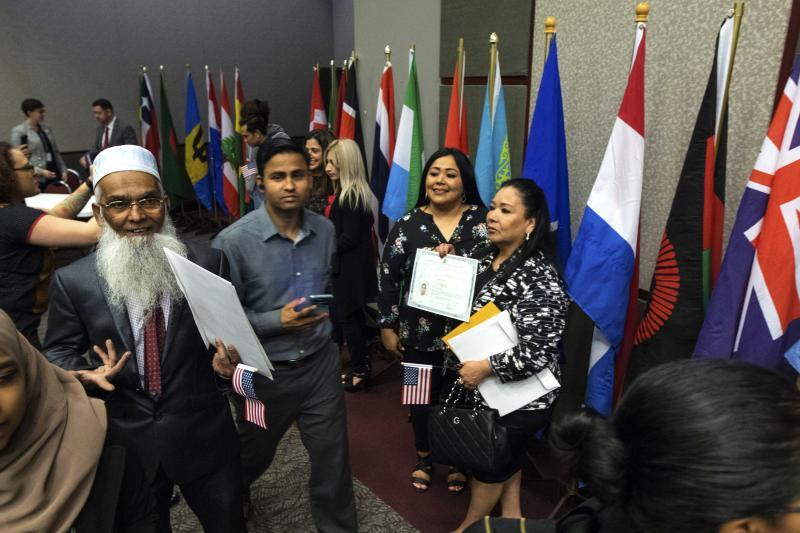
Following the ceremony, the new U.S. citizens posed with their new certificates for photos with family and friends in front of flags representing their many countries of origin.
After taking the oath, the participants’ first act as citizens of the United States was to recite the Pledge of Allegiance, followed by thunderous applause.
“We welcome you to the great experiment that is the United States of America,” Lane said. “This great country of ours is not perfect. Nonetheless, it remains the best hope of security, opportunity and promise that, in my opinion, this world has to offer.”
Lane concluded by encouraging the new U.S. citizens to be prepared to embrace all that their new lives in the United States offer, but, “Never forget where you came from and who you left behind.”


